Opinion
ADIEU MAMA CHRISTIANAH IBIRONKE OSHUNTOLA, CLASSIC “IYANIWURA”
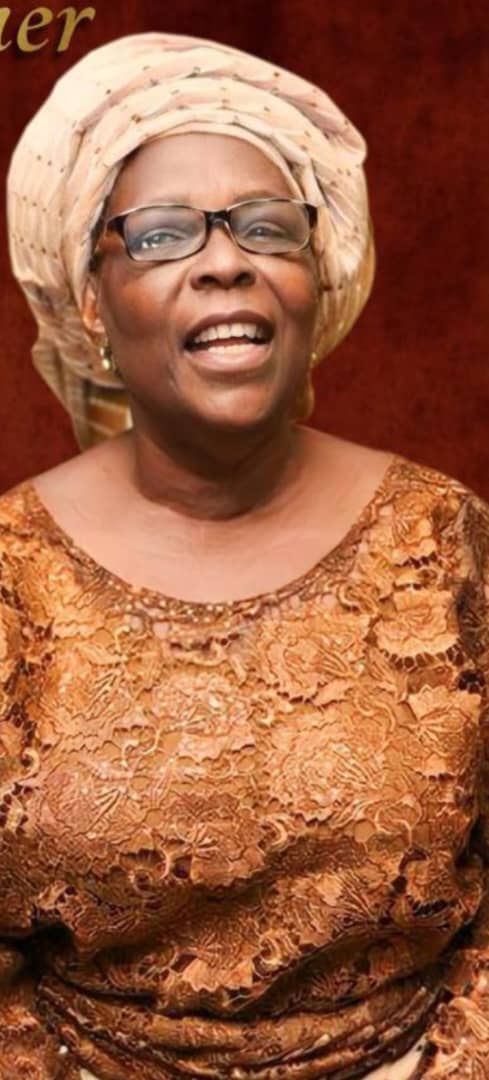
*By Tunde Olusunle*
Except you have the luxury of a precursor from your family, or you previously cultivated concrete amities, residential accommodation for a new employee deployed to work in Lagos can be a palpable challenge. I was recruited by the primordial Daily Times of Nigeria Plc in 1990 when Yemi Ogunbiyi, the charismatic, visionary and stamina-imbued former university scholar was chief executive of the organisation. My letter of employment was dated April 1990 but didn’t get to me until four months later. Even at that I had every cause to be thankful that it finally came. What if it got missing in the hands of the Nigerian Postal Service, (NIPOST) as was very plausible under the organisation’s virtual monopoly of mail distribution and courier services those days? I couldn’t wait to disengage from the services of the Kwara State government under which I had served in the four preceding years as a graduate teacher. So, Lagos, here I come!
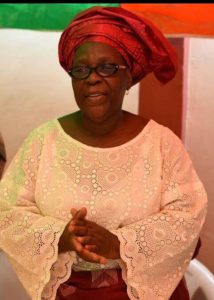
I was a quasi-nomad during the first few months of resumption at the Agidingbi, Ikeja, Lagos complex of the erstwhile Daily Times. I stayed with a cousin in *Idi-Araba* and subsequently with Gbenga Ayeni my classmate and brother from our first day in the university who was already settled in the Daily Times. He was in the Lagos bureau of the London-based *West Africa* magazine which was owned by the Daily Times of Nigeria Plc. Such was the foresight of the iconic Babatunde Jose, first indigenous chief executive of the Daily Times octopus. I remember asking Ayeni during one of our exchanges whether the organisation was not bothered about the welfare of its personnel. Cruelly but matter-of-factly, he told me that so long as I diligently filed your copies, it wouldn’t matter to the newspaper behemoth whether I slept beneath Lagos bridges!
I reached out to my father in Ilorin who once told me he had a friend and former colleague in Lagos. My father had worked with Livestock Feeds Ltd which was a subsidiary of Pfizer Nigeria Ltd, from the late 1960s to the late 1970s. He was variously manager at the Kaduna and Benin City plants. Within the period, he had met Pastor Femi Oshuntola and both men developed a close relationship. They had both retired and settled variously in Ilorin and Lagos. I couldn’t continue living in Lagos like a *Fulani* herdsman so my father graciously gave me a note to his friend in Lagos and asked me to locate his friend.
I traced Baba Oshuntola’s place in Ifako-Ijaiye one of those evenings. Fortuitously, I met him. I introduced myself and handed over the note from my father to him. He pored through the correspondence and shook hands with me. He immediately called out to Mama Oshuntola his wife, introduced me and handed me over to her. The “handing over ceremony” had barely been completed when Mama called Jide and Bankole the two boys in the family. “He is your elder brother,” Mama told them. “He is the son of one of your father’s very close friends and works with the Daily Times. He will stay in your room for as long as he is with us so please tidy up the place and make it available.” And that was how I was taken in and integrated into the Oshuntola family. I participated in the daily family morning devotions and attended the Foursquare Gospel Church which was the family’s denomination.
As media practitioners our official schedules can be unpredictable. Technology was not as advanced those days as different from the pampering it has availed us in today’s world where we can do almost everything with our handheld devices. As a reporter or writer, you had to physically go after the story, interview your subjects and attend events from which you could derive your reports or essays. You wrote in longhand, secretaries in the newsrooms typed your copies, you proofread them, and in some instances you planned the pages as part of the newspaper production process. The open-ended process ensured you couldn’t place your hands on a specific closing time from work. As a young man, I also sat out with friends from time to time to have a few drinks and also take in some culinary ancillaries. The Oshuntolas understood my situation very well and never for once did they chastise me or lock me out. Rather, Mama’s worry would be about if I had had a meal all day or not.
My wife, Funmi and I were still in courtship and she worked with “CSS Bookshop Press” in Lagos. I introduced her to the Oshuntolas and she was wholly and totally embraced. She was accredited to Mama Oshuntola’s kitchen and she took turns with the ladies in the family at the time, Yemisi, Bunmi and Opeyemi to prepare meals for the family. A trained and retired nurse like my own mother, Mama Oshuntola operated the “Golden Mother Clinic and Maternity Centre” within the complex of the family house which was established in 1985. It remains the go-to medical facility in the Ifako-Ijaiye district on account of its uncompromising professionalism. To be sure, the very first child with which my family was blessed, was born into Mama Oshuntola’s arms! I was out there chasing what to write about when my wife fell into labour. By this time we had secured an apartment a whistling distance from the Oshuntolas. Once they got to know that my wife was feeling the pangs of birth, Baba Oshuntola quickly drove to our home to pick up my wife. Such unparalleled affection by the Oshuntola clan.
The good news was conveyed to me via land telephone which was the vogue those days while I was attending a meeting of the editorial board in Daily Times. I promptly obtained permission to go see my folks. I went straight to Mama Oshuntola’s office on arrival to thank her for her motherly kindness. She referred me straightaway to the private ward my wife and newborn were. “Go to that room,” she ordered, “Greet your wife and kiss her, take the baby in your arms and pray together as a blessed family.” If that was touching, then wait for the next. After complying with her guidance I returned to her office to ask for our bill. “You have no bill to settle,” she shocked me. “But quickly get across to your mother in Ilorin and your mother-in-law in Ibadan. Mother and child remain under my watch until I see one of the grandmas.” That was how conscientiously motherly, how generous in spirit she was.
On one of my cross-country tours prospecting for business opportunities, I experienced more bowel movements than normal. My driver had to pull over from the road on many occasions. I had a message to deliver to the Oshuntolas as I got into Lagos on that occasion so their residence was my first port of call and I planned to proceed to the hotel thereafter. I was welcomed by Mama Oshuntola who promptly took me to her office. “You look dehydrated, pale and fatigued,” she said as she checked my vitals. I told her my experience on the trip. Unknown to me, I was suffering from food poisoning. She summoned one of the senior hospital staff and I was taken to a VIP ward. My wrist watch and telephone were taken and handed over to Bankole as a drip was set up for me. I was monitored all through the night. That is the classic Mama Oshuntola.
Christianah Ibironke Oshuntola (nee Odeneye) was born on new year’s day, January 1, 1946 in Ijebu-Awa, Ijebu-Igbo local government area of Ogun State. She had her foundational education in primary and secondary schools in her home community. She was briefly a teacher in Aperin near Ibadan before crossing over to the Catholic Hospital, Oke-Agbo, Ijebu-Igbo as an auxiliary nurse in 1963. Committed to the pursuit of her dream nursing career, she attended the Nursing School in Eleiyele, Ibadan and completed her practical training at the Ijebu-Igbo General Hospital. Upon qualifying as a nurse and duly certificated, she worked at the Ikeja General Hospital, Lagos, between 1969 and 1970. She proceeded to the Island Maternity Hospital, Lagos for her midwifery training from 1970 to 1971.
She obtained a one-year “out-station” experience at the Ejirin Health Centre, Epe and returned to the General Hospital, Ikeja in 1972 and stayed on till 1979. Mama Oshuntola desired to impact her community with her knowledge and experience in healthcare provision. The Ifako-Ijaiye area was just developing and the visionary Mama Oshuntola reckoned that residents of the emergent district could do with proximal medical facilities as against more distant ones. For six years beginning from 1979 therefore, she garnered requisite insights in managing a private health concern by working at County Hospital, Ogba, Ikeja. In March 1985, her dream for a self-owned clinic came to fruition with the setting up of “Golden Mother Clinic and Maternity.” That name is the authentication of who she truly was, a mother with a heart of gold. The outfit will be 40 years in 2025.
Mama got wedded to Pastor Olufemi Oshuntola in 1966 and the union has been blessed with five children and many grandchildren, biological and adopted. Baba Oshuntola passed in 2013 and was interned in Oyo his hometown in Oyo State. Mama Oshuntola was as diligent in service to God as she was in her profession as a lifesaver. She was well-known at the local, zonal and district levels of the Foursquare Gospel Church. She was President of the Foursquare Women International, (FWI) for six years and was ordained a “Deaconess” for her good works. She was further promoted to the rank of “Elder” as she ascended higher leadership levels in the mission. Within her local community, Mama Oshuntola was President of the “Ifako Progressive Union,” (IPU) for 10 years.
Mama turned 78 on Monday January 1, 2024 and passed on a few weeks later. Her rites of passage have been scheduled for Thursday March 21 and Friday March 22, 2024 in Lagos. She was an incredibly generous, affectionate and inspirational matriarch. We will all miss her warmth, candour and earthiness. May her soul rest in the bosom of the Lord.
*Tunde Olusunle, PhD, is a Fellow of the Association of Nigerian Authors, (FANA)*
Opinion
Dismantling the false Narrative of a “Coup” in Rivers State
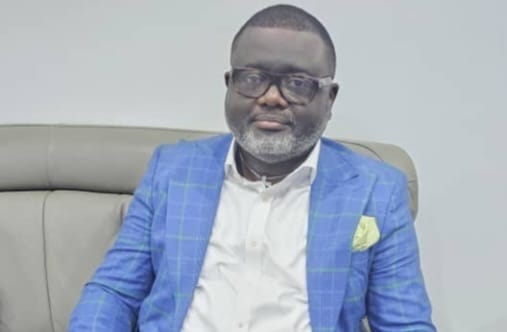
By Jones Onyereri
The assertions that President Tinubu’s intervention in Rivers State constitutes an unconstitutional power grab or a “military coup in civilian disguise” fundamentally misrepresent the legal, political, and security realities that necessitated federal action. Far from being a partisan maneuver, the declaration of a state of emergency and subsequent measures were lawful, proportionate, and grounded in the imperative to prevent a total collapse of governance and public order. Below is a thorough rebuttal to the allegations:
The Nigerian Constitution explicitly empowers the President to declare a state of emergency under Section 305 when there is a clear threat to public safety or a breakdown of governance. The escalation of pipeline vandalism by militants—which crippled economic activity, endangered lives, and exacerbated environmental degradation—coupled with the Supreme Court’s February 18 judgment highlighting governance failures in Rivers State, provided incontrovertible justification for federal intervention. The claim that “no emergency existed” ignores the state government’s demonstrable inaction in addressing these threats, which risked spiraling into wider violence. Emergency powers are, by design, temporary and exceptional, aimed at restoring stability, not undermining democracy.
The appointment of Admiral Ibok-Ete Ibas as Sole Administrator aligns with constitutional provisions for federal intervention during crises. Section 11 of the Constitution permits the National Assembly to legislate for a state in extraordinary circumstances, and the President’s action enjoys implicit legislative backing as a stopgap to avert anarchy. Admiral Ibas, a retired military officer with no overt political ties, was selected for his administrative expertise, not as a proxy for any faction. His mandate is strictly limited to stabilizing the state, facilitating the return to democratic governance, and ensuring the security forces can operate without partisan interference. To equate this with a “military coup” is hyperbolic and disregards the transparent, legal framework guiding his role.
Critics allege defiance of Supreme Court orders regarding state funds, but this misinterprets the interplay between judicial mandates and emergency executive authority. While the Court initially restricted financial flows to Rivers State due to governance disputes, the escalation of the crisis necessitated federal release of funds under the “doctrine of necessity” to sustain critical services like healthcare, education, and infrastructure. The Constitution prioritizes the security and welfare of citizens (Section 14(2)(b)), and the President’s duty to uphold this principle supersedes rigid adherence to procedural norms during emergencies.
The Sole Administrator’s actions, including the formulation of regulations and restructuring of local government administrations, operate within the bounds of his provisional mandate. These regulations require approval by the Federal Executive Council (FEC), ensuring oversight and accountability. The replacement of local government officials was not a “power grab” but a necessary step to dismantle networks complicit in revenue diversion or inefficiency. The Supreme Court’s insistence on democratically elected local governments remains sacrosanct, but interim appointments during emergencies are globally recognized mechanisms to restore functionality before elections can be organized.
Claims that the Administrator has overstepped by preparing a budget or appointing a Secretary to the State Government (SSG) ignore the practical realities of governance. In the absence of a functional State Assembly, provisional budgets based on existing frameworks ensure continuity of public services. Similarly, the appointment of an SSG—a routine administrative role—falls within the Administrator’s authority to maintain bureaucratic operations. These measures are neither permanent nor unconstitutional; they are transitional tools to prevent total institutional paralysis.
The narrative that this intervention serves Minister Wike’s political interests is speculative and distracts from its stated purpose. Restructuring boards and commissions, including the Rivers State Electoral Commission, aims to depoliticize institutions vital to free and fair elections. The focus on “Wike loyalists” assumes nefarious intent without evidence, whereas the Administrator’s appointments could equally reflect efforts to engage experienced personnel familiar with the state’s administrative landscape. The assertion that federal actions target Governor Fubara’s allies conflates routine accountability with persecution; in crises, restructuring is inevitable to eliminate inefficiency or bias.
Regarding the House of Assembly reconstruction, federal involvement ensures the project adheres to timelines and standards, avoiding further delays that could destabilize legislative functions. The Governor’s progress, while commendable, does not negate the need for independent oversight in a volatile environment.
President Tinubu’s intervention is neither indefinite nor authoritarian. Emergency measures will lapse once security is restored, and democratic structures are reinstated. The National Assembly retains the authority to review and curtail these actions under Section 11, ensuring checks and balances. To frame this as a “2027 political takeover” is a cynical distortion of a lawful, necessary intervention to prevent Rivers State from descending into chaos.
In conclusion, the allegations of a “civilian coup” or unconstitutional power grab disregard the constitutional safeguards and urgent pragmatic considerations guiding federal actions. The President’s duty to protect lives and livelihoods in Rivers State transcends political expediency. While vigilance against overreach is prudent, dismissing all stabilization efforts as partisan machinations undermines the legitimate pursuit of peace and order. The people of Rivers State deserve functional governance, not perpetual crisis—and federal intervention, however imperfect, is a constitutional means to that end.
Rt Hon Sir Jones Onyereri PhD, KSP, FCIPAN
April 12, 2025
Opinion
Tik Tok gets another lifeline from being banned

By Sonny Aragba-Akpore
On Saturday April 5,United States President Donald Trump announced an extension of 75 days for Tik Tok on his Truth Social platform, saying the TikTok deal “requires more work to ensure all necessary approvals are signed.”
He said he is signing an executive order “to keep TikTok up and running for an additional 75 days.”
With this development, the 170 million subscribers connected to Tik Tok in the United States of America (USA) have another 75 days to meander on the App unhindered.
This new deadline which an Executive Order covers follows the expiration of the first 75 days Order on April 5.
Tik Tok owners,ByteDance of China, have these 75 days to divest completely from the American operations or risk being sent to the dark or being banned.
China faces a 54% aggregate tariff on goods imported into the US, and has retaliated with 34% in counter tariffs.
Reports suggest several potential buyers for TikTok have cropped up in recent days.
Amazon has put in a last-minute offer to the White House to acquire the platform, according to Agency reports though the firm has declined comment.
Several other potential buyers include billionaire Frank McCourt, together with Canadian businessman Kevin O’Leary. Alexis Ohanian, who co-founded Reddit, has said he has joined Mr McCourt’s bid.
Computing giant Microsoft, private equity giant Blackstone, venture capital firm Andreessen Horowitz and search engine Perplexity AI are also reportedly in the running for a stake.
Trump has said his administration was in touch with four separate groups interested in a potential TikTok deal, though he has not named them.
Vice-President JD Vance is spearheading the administration’s effort to find a buyer.
The president has also suggested the US could offer a deal where China agrees to approve a TikTok sale in exchange for relief from US tariffs on Chinese imports.
“We hope to continue working in Good Faith with China, who I understand are not very happy about our Reciprocal Tariffs,” Trump wrote on Truth Social.
He added that the trade levies are “the most powerful economic tool, and very important to our national security”.
Trump granted TikTok a second 75-day extension to comply with a law that requires the hugely popular video app to either sell its US operation or face a ban in the country.
“We do not want TikTok to ‘go dark’,” Trump wrote on Truth Social. “We look forward to working with TikTok and China to close the Deal.” The platform is currently owned by Chinese company ByteDance.
Trump’s first extension was granted after he took office in January and this expired on Saturday,April 5,2025.
In a statement on Friday, April 4,ByteDance said it had been in discussion with the Trump administration, but “an agreement has not been executed”.
“There are key matters to be resolved. Any agreement will be subject to approval under Chinese law,” a spokesperson said.
Former US President Joe Biden’s administration had argued that TikTok could be used by China as a tool for spying and political manipulation.
Congress passed a bipartisan law last year that gave ByteDance six months to sell its controlling stake in TikTok or see the app blocked in the US.
Opponents of a ban have cited freedom of speech as a reason for keeping the platform open.
But the new extension comes as the Trump administration tries to broker a deal to bring the social media platform under American ownership, and keep the popular app running in the US.
“The Deal requires more work to ensure all necessary approvals are signed,” Trump wrote on his Truth Social platform on Friday.
The social media platform, which says it has more than 170 million users in the US, must close in the US under a law passed by Congress – unless a buyer is found.
Agency reports that a TikTok deal was nearly finalised on Wednesday last week but fell apart after Trump on the same day announced sweeping global tariffs, including on China.
Agency reports further explained that ByteDance representatives contacted the White House to inform them China would no longer approve the deal unless negotiations on the tariffs could take place .
Unnamed sources said the plan had been for Trump to sign an order initiating a 120-day period for closing the deal, allowing time to finish paperwork and secure financing.
The agreement had won approval from existing investors, new investors, ByteDance, and the US government, but China backed out once Trump imposed the global import taxes.
The Chinese embassy in Washington DC said in a statement that it “opposed practices that violate the basic principles of the market economy”.
A federal law signed by former President Joe Biden in 2024 effectively banned TikTok if it remained under Chinese ownership. The initial law called for the app to permanently go offline on Jan. 20, but Trump signed an executive order extending the deadline by 75 days.
The US TikTok ban, which received overwhelming bipartisan support, required TikTok’s parent, ByteDance, to divest the short-form video app over US concerns that it posed a national security threat.
US officials have long argued that the Chinese government, which is designated as a US adversary, could gain access to Americans’ TikTok user data for nefarious purposes or use the platform to spread propaganda.
The US law banning TikTok forces web service providers to stop hosting the app and requires Apple and Google to pull it from their app stores.
TikTok took a challenge to the law all the way to the US Supreme Court, arguing that it infringed on the company’s First Amendment and other constitutional rights. A group of TikTok users made similar claims in a companion case, claiming they, too, had been deprived of constitutional protections.
But the high court ruled in favor of the government, reasoning that TikTok, as a foreign entity, wasn’t entitled to constitutional protections and that national security concerns outweighed the government’s restriction on TikTok use. The court also said the law was limited in its infringement on free speech because social media users could access and post on other social media platforms.
The Act to ban Tik Tok if it did not divest its operations in the USA was signed with broad support from Republicans and Democrats.
Although some lawmakers had urged President Joe Biden to grant a reprieve to prevent TikTok from going dark in the U.S. as soon as Jan. 19,2025 ,the TikTok ban had already resulted in a number of “TikTok refugees” who moved to another Chinese app, RedNote, short for “Little Red Book.” RedNote became the most downloaded app in Apple’s app store in the U.S. the week leading up to the Supreme Court’s decision. If this trend continues, this “migration” to a similarly situated app might defeat the purpose of the Act. The TikTok ban illustrates how U.S. regulatory actions are designed to mitigate potential threats posed by foreign adversaries, significantly increasing compliance requirements for cross-border investments and technology operations. Particularly, the Supreme Court’s decision upholding the TikTok ban underlines the trend of intensifying scrutiny of foreign-controlled entities that collect or handle sensitive data in the U.S.
Although it’s not clear whether there will be a reprieve for Tik Tok,there are strong indications that the Trump administration needs more time to understand the situation and perhaps to be the one to implement the ban.
TikTok has 1,925 billion users globally, with 170 million monthly active users in the United States.
The average daily time spent on TikTok has more than doubled from 27 minutes in 2019 to 58 minutes in 2024.
The most popular categories on TikTok are Entertainment, Dance, and Pranks, with billions of views each.
Top influencers on TikTok include Charli D’Amelio, Khabane Lame, and Addison Rae, each with tens of millions of followers.
TikTok’s user base has grown exponentially from 133 million in 2018 to over 1,925 billion in 2024.
Daily active users on TikTok have skyrocketed into the millions, reflecting the platform’s ability to engage users on a daily basis.
In the year 2020, Trump issued an executive order citing TikTok’s ability to capture vast amounts of user data as a significant national security threat. The order sought to prohibit certain transactions involving ByteDance but was blocked by federal courts.
Subsequently, the Trump Administration directed ByteDance to divest its U.S. TikTok operations and user data, but these efforts were stalled as negotiations with the president Joe Biden Administration aimed at a nondivestiture agreement failed to resolve the government’s concerns.
ByteDance’s proposed national security agreement was ultimately deemed insufficient to mitigate risks posed by Chinese control. Against this backdrop, Congress enacted the sale-or-ban law, further targeting TikTok and similar applications.
> According to the Supreme Court’s finding, TikTok’s ultimate parent company, ByteDance, is a privately held company that has operations in China. ByteDance owns TikTok’s proprietary algorithm, which is developed and maintained in China. The company is subject to Chinese laws that require it to assist or cooperate with the Chinese government’s intelligence work and to ensure that the Chinese government has the power to access and control private data that the company holds.
Underscored in the decision, TikTok’s extensive data collection from more than 170 million U.S. users could be exploited for surveillance, public influence campaigns or other harmful purposes that threaten national security. The Act and the holding reflect Congress’ and the Supreme Court’s efforts to address growing concerns over foreign adversary-controlled applications through the access to sensitive data of U.S. nationals and the resulting potential risks to U.S. national security.
Opinion
INSPIRING TAKEWAYS AT TUNDE OLUSUNLE’S DIAMOND SOIREE
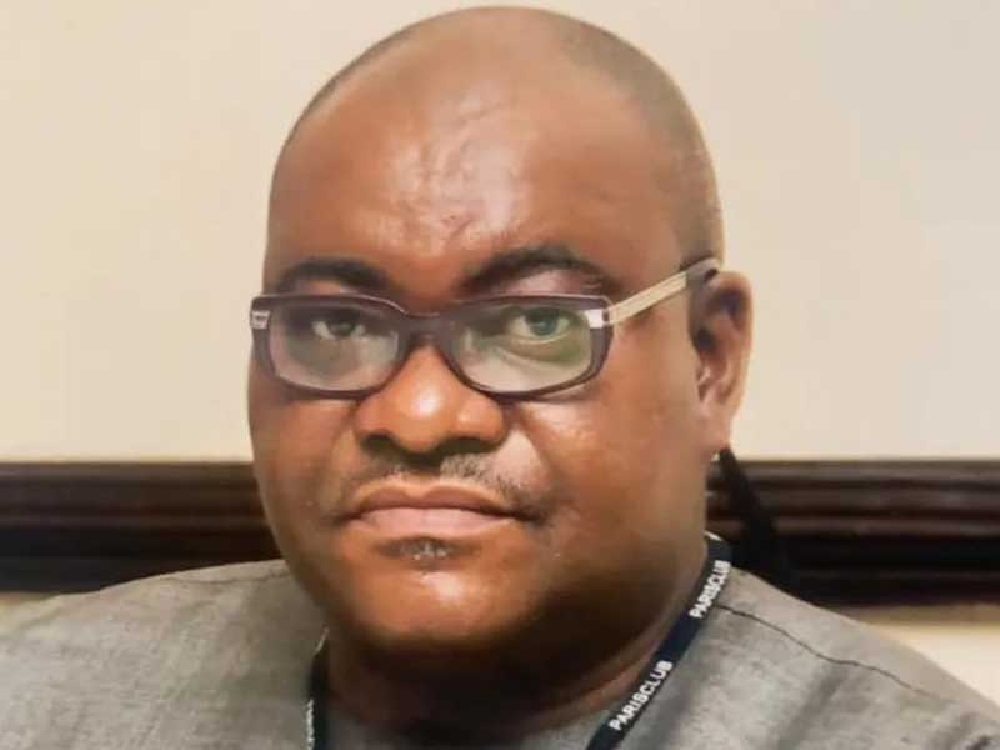
BY BOLAJI AFOLABI
Oftentimes, it’s always challenging to organize commemorative parties for those who have distinctions in this pastime. Dr. Tunde Olusunle, Adjunct Professor of Creative Writing at the University of Abuja; recently re-named Yakubu Gowon University is one of the few masters in the game. Over the last two decades of close relationship with him, he has played massive roles in organizing parties for people. Call him a highly-rated events planner, you may not be wrong. He is not the usual, typical party planner around who has taken up the vocation as business. Olusunle does this for people dear to him; friends, bosses, colleagues, associations, communities, and more pro bono. At any of these occasions, he throws everything towards making the event successful. He invests his time, intellect, organisational savvy, and personal resources; months, weeks, and days to make the event grandiose. Some of his close friends eulogized his dexterity, expertise, and capacities in single-handedly coordinating parties, events, and other celebrations.
The writer, cognisant that Olusunle will mark his birthday in the month of March, was somewhat worried. Why? This year’s birthday was different, as the multi-tasking professional will climb “six stairs” and join the unique club of 60. So, who will coordinate a befitting birthday shindig for the “master organizer?” Can such match the quality of similar others that Babaeto; one of his titles, and moniker loosely translated as “Chief Organizer” has arranged for people? How can the standard set by him be met, if not surpassed? Still pondering, a thought came to mind. Given the national economic crisis that has led to accentuating poverty, staggering hyperinflation, disabling unemployment, corrosive hunger, and more, Olusunle; who is ever conscious of situations around him, may spring surprises. He may opt for simpler and modest celebrations.
About two weeks to d-day, an e-invite forwarded to the writer confirmed one’s thought. The card was beautiful in colours; aesthetic in design; and unique in words. Having close similarities with Babaeto’s imprimatur, it read, “please join us for drinks, bites, and laughter as we commemorate the Diamond Birthday of our father, husband, brother, and good friend; Tunde Olusunle ……” Further checks confirmed that the event was packaged by Dr. Funmi Olusunle, with Aramide, Yomi, and Tobi; wife and children of Babaeto was to be a modest gathering of people. On this, the “plotters” scored a bull’s eye. Surely, Olusunle will be excited that his ever-loving, dependable, and reliable better-half of over three decades, and scions are gradually “edging him out” in the plotting, planning, and execution of numerous surprise parties for people.
The weather on Sunday, March 30 was clement and friendly, away from the scorching sun of the previous day. This was the first surprise while heading to the event. Driving through the Gaduwa-Lokongoma axis of the capital city, the writer had another round of pleasant surprises. Making a detour, vehicular movements to the Estate gate; which was over 400 meters away, gave an idea of what to expect. After “snaking and snailing” through the entrance, which was about 100 meters to the residence, it became clear, and evident that this may not be a small event, as originally planned. The writer, struggling for a comfortable parking space, recalled what Pastor Tumo Ojelabi; a retired Director, Federal Ministry of Information earlier said, “Oga is a friend to all. It is almost impossible to have a small party to mark his 60th birthday. Many people will attend the event, either invited or not.”
Scheduled to officially commence by 5 pm, the programme was up and running an hour before. Given the elaborate preparations for any eventualities, the early arrivers were treated to a collage of bites, drinks, and soul-lifting songs. In between, there were memorable photo sessions on the lush green carpet emblazoned with Olusunle’s very visible portrait properly affixed. As the day progressed, more people made their ways to the beautifully decorated outer foyer of the celebrant’s residence. Hearty exchange of pleasantries, excited high-fives, warm embraces, friendly hugs, and more swept the entire atmosphere. The lively gathering was an admixture of grandparents, fathers, and mothers. Not forgetting the youths, and children. Typical of Olusunle’s enviable virtues of accessibility, humility, humanity, and inclusivity, guests and attendees cuts across different strata of the society.
With Yomi standing-in for the day’s master of ceremonies, (MC), the programme commenced a few minutes past five in the evening. Pastor Omotoba of the Redeemed Christian Church of God, (RCCG) offered the opening prayers, which was brief and impactful. Yomi, as the fill-in compere did a good job, as she was able to galvanize the audience with few jokes, gesticulations, and puzzles. Perhaps sensing the bulk of the happy guests were in their 40s to 60s, she requested for the rendition of early-school rhymes in the 1970s to late 1980s. Masterstroke! Led by a few ladies, the entire place came alive as it brought back nostalgic memories. Thereafter, the MC took over. Aramide delivered a “love letter” that was full of emotions, inspiration, and gratitude. Tobi, the “baby” of the house, who is a strong supporter of English Premier League’s Manchester United was working behind the scenes to ensure the overall success of the birthday bash.
Virtually all those called to describe Olusunle in one word, used the opportunity to heap praises, prayers, and commendations on him. Dr. Tivlumun Nyitse, Associate Professor of Mass Communications at Bingham University, Abuja, confirmed that, “we have been friends for over 40 years. Over the years and decades, the relationship has grown from family to brothers. As I wish him a happy diamond birthday, I advise him to slow down.” Dr. Femi Ajisafe, an agriculture entrepreneur affirmed that, “we both joined, and started work as secondary school teachers somewhere way-off modernity in a rustic, and sleepy community in Kogi state over three decades ago. Happily, we have been together; and our respective families ever since.”
Saluting Olusunle’s resilience, Dr. John Olarewaju, former Director-General, Michael Imodu Institute of Labour and Development Studies, (MIILDS) revealed, “he is ever dogged, determined, and sacrificial. So committed and consistent with writing that he can do it anywhere.” For Dr. Clem Baiye, former Managing Director, Daily Times PLC, “Olusunle is a go-getter.” An obviously joyous and excited Madam Elizabeth Olusunle, Mother of the celebrant expressed appreciation to family members and friends, particularly Dr. Funmi Olusunle for her steadfast love, and consistent understanding of everyone. Mama, also prayed for her dear son. The session ended with an inspiring Yoruba rendition by Anuoluwapo Favour Fabiyi; a hugely gifted and brilliant teenager.
As the evening progressed, it was clear that the planned simple hoedown turned to a classy, high-energy reception laced with flair and flash. Evidently wrapped in panache, pomp, and pageantry. From meals to drinks, jokes, and more, the get-together had trappings of charm, elegance, and sophistication. The dazzles and allure literally arrested everyone all through. It was exciting, entertaining, and memorable. Filled with thrills, frills, grills, and much more. The night was filled with revealing stories and engaging reminiscences that will be inspiring takeaways for many people. The excellent dishing and mixing of “old school” songs got many; including the writer either humming the lyrics, shaking heads, moving bodies or hitting the dance floor.
Indeed, the quality and quantity of guests who came to honour Olusunle; at short notice was a worthy testament of the recognition and acceptability of the celebrant as a “peoples man.” The roll call of personalities was large. Chief Onyema Ugochukwu, pioneer Chairman, Niger Delta Development Commission, (NDDC), and his lovely wife, Dr. Joyce Ugochukwu; AIG Tony Olofu, (Rtd), and wife, DIG Rhoda Olofu; Hon. Leke Abejide, Member representing Yagba Federal Constituency, and his wife were there. Dr. Boboye Oyeyemi, former Corps Marshall, Federal Roads Safety Corps, (FRSC); Pastor Tunde Ipinmisho, former General Manager, Public Affairs, Federal Housing Authority, (FHA); Prof. Sunnie Ododo, former Chief Executive Officer, National Theatre. Dr. Emmanuel Ikpeme, Deputy Secretary-General, Nigerian Football Federation, (NFF); Chief Femi Melefa, consultant and entrepreneur; Pastor Yomi Babaniyi, and wife, and many others graced the occasion. Not forgetting Hon. TeeJay Yusuf, and Deputy Corps Marshall Clement Oladele, who were out of the country and Abuja respectively, but extended their congratulatory messages to Olusunle.
As the elegant soiree spread late night guests had more to savour. Properly garnished, sumptuous delicacies, refrigerated drinks, and eye-popping small chops flowed endlessly. Undoubtedly, the knees-up; according to the British were exhilarating and enthralling. For many, the event, turned out to be a worthy, timely rendezvous of sorts. There was a reunion of old friends; re-kindling of friendships; and building of new networks. Many agreed that it will be an unforgettable experience.
* BOLAJI AFOLABI, a Development Communications specialist was with the Office of Public Affairs, The Presidency, Abuja.
-

 News23 hours ago
News23 hours agoConstituents Drag Akpabio, Senate to Court Over Suspension of Natasha
-
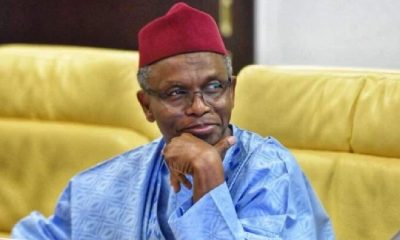
 News9 hours ago
News9 hours agoWe only had lunch with Buhari not 2027 politics -El-Rufai
-

 News22 hours ago
News22 hours agoFCT minister, Wike gives land allotees 21 days to pay or lose offer
-

 News9 hours ago
News9 hours agoSad! Explosion rocks Lagos
-

 News9 hours ago
News9 hours agoParts of Abuja, Niger in total darkness -AEDC confirms
-
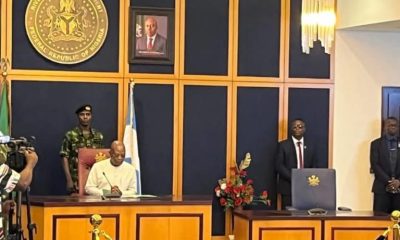
 News8 hours ago
News8 hours agoIbas gives reasons why Sole Administrators were appointed for Rivers councils
-
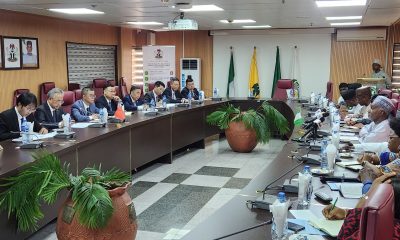
 News24 hours ago
News24 hours agoNigeria-China Reaffirms Commitment To Strategic Partnership
-

 News7 hours ago
News7 hours agoUS embassy announces new requirements for visa interviews for Nigerian applicants





